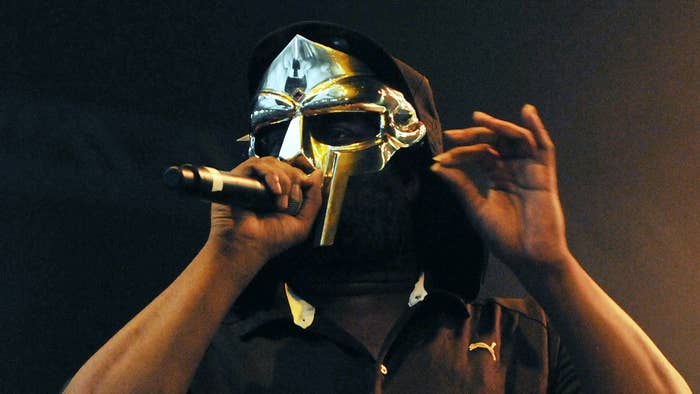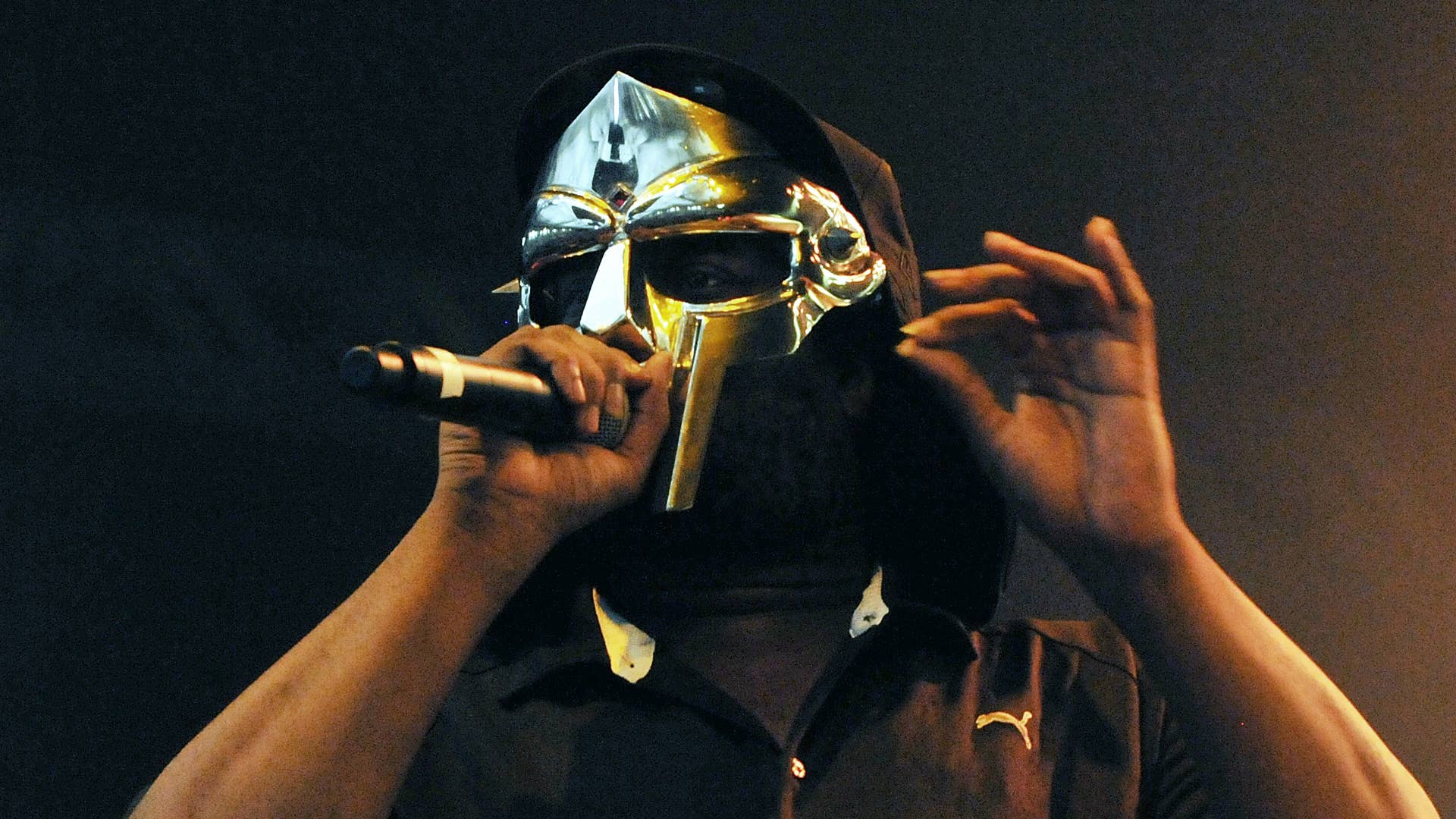
We knew everything and nothing about Daniel Dumile, which is exactly how he wanted it. Masks are for mythmaking, for telling new stories and reinventing old ones; his was a talisman, a gateway for alter egos and new creative zones.
We knew him as MF DOOM, but also as Zev Love X, Viktor Vaughn, King Geedorah, and Madvillain. His raps, like his personas, were slippery and multifarious. No subject was off-limits, and no rhyme scheme too ambitious. The bars were knotty koans, funny and deadly serious in the same breath. He wrote about food and fun, but also about loss and the power of friendship. He was a lyrical trickster, a self-styled supervillain, and an enigma until the end. According to a statement shared by his wife, Jasmine, on Thursday, Daniel Dumile died on October 31 at the age of 49.
Born in London and raised on Long Island, Dumile started off maskless, rapping under the name Zev Love X. He and his brother Dingilizwe, aka DJ Subroc, started a group called KMD with a friend of theirs in the late 80s; a show-stealing guest spot from Zev on 3rd Bass’ “The Gas Face” helped KMD land a deal with Elektra Records, and the group released their debut album, Mr. Hood, in 1991. The trio shrunk to a duo, and Zev and Subroc began work on a follow-up, Black Bastards. Tragedy struck in 1993, when Subroc was struck by a car and killed, leaving his brother to finish the album himself. Just ahead of the planned release, Elektra shelved the record and dropped KMD, thanks in part to the album’s cover art—a cartoon of a Sambo figure being lynched—which had drawn criticism from Billboard.
Then Dumile went dark. A supervillain needs an origin story, and this was his. Scorned by the industry, he ditched it and took the better part of the decade to reboot. Then he reemerged in the late ’90s with a mask—first a stocking, then a replica of the metal faceplate from Gladiator—and the name MF DOOM. The album he recorded during that period, Operation: Doomsday, upped the ante on just about every level, with eclectic beats and casually dextrous flows that anchored some of the most impressive rhymes of his career. DOOM’s crate-digging production sensibilities and taste for superhero cartoon samples (the name DOOM, beyond just being a pun on “Dumile,” nods to Marvel’s Doctor DOOM) lent Operation: Doomsday a whiplash feel, but the technical prowess was inarguable, and the artistry was singular. DOOM ended the album with “?,” a tribute to his late brother. Its final line is a simple, timeless affirmation: “Everything is going according to plan, man.”
What followed was a kind of creative peak. 2003 saw the release of Take Me to Your Leader under the moniker King Geedorah (DOOM’s take on the three-headed dragon of Godzilla fame), and Vaudeville Villain, attributed to Viktor Vaughn, a time-traveling scientist character. DOOM did an entire interview in character as King Geedorah at the time, with CMJ New Music Monthly. “Last time I was here, it was beautiful,” he said, before clarifying: “This was millions of years ago. It’s beautiful now, too, but it was ill then.”
This was the essence of DOOM: sometimes whimsical, often hilarious, and always deeply committed to the bit. That commitment reached its apotheosis on Madvillainy, DOOM’s 2004 collaboration with the producer Madlib. He’d flown out to L.A. in the summer of 2002 with the express goal of making an album; his daily routine essentially consisted of writing rhymes, smoking a ton of sour diesel with Madlib, and, very occasionally, joining the producer for a night at the club. The result is one of the headiest underground hip-hop albums ever recorded—the place where Steve Reich samples meet lyrics about getting high at convenience stores and extended metaphors about girls with bad breath.
When I spoke with DOOM on the phone in 2019 about the making of the record, I was struck by how earnest and attentive he was. That he agreed to speak with me at all felt like a minor miracle, given that he’d spent the past decade in exile (a British citizen, he was barred from returning to the U.S. after an international tour in 2010) and had been selective about interviews since the release of his last solo project, Born Like This, in 2009. But far from playing the part of the elusive expat, DOOM was kind, and even a little bashful.
“[Madlib] is kind of popular,” he told me, recalling a particular night out. “People know his face. I don’t get no problems; motherfuckers don’t know me.”
DOOM had been writing himself into a sort of epic, comic-book narrative since before he put on the mask, but he was also very clearly a private person—not exactly a surprise for an artist who’d spent the past 20 years obscuring his face. My first question for him, about where he was calling from, yielded an extremely cryptic reply: “Oh, somewhere in the E.U.” He put a finer point on it in an earlier interview with Ta-Nehisi Coates for The New Yorker. “Fame never helped the situation,” he said. “Fame, in the streets, is something you don’t want.”
His elusiveness was one of his greatest gifts. He knew when to cede the floor, when to pass the mic; DOOM neglected to give himself a verse on “Guinnesses,” a song from his 2004 album Mm..Food, and the tracks “I Wonder” and “Next Levels” on Take Me to Your Leader. These are moments where the guests and production do the talking.
In 2017, DOOM revealed that his son, King Malachi Ezekiel Dumile, had died. When I asked DOOM about him during our conversation, he told me, “Make sure you get his name in there, make sure you shout him out. King Malachi. The best baby boy I could ever imagine having. He was a king, a born king.” I could feel him beaming through the phone.
DOOM eschewed convention and never courted commercial success, proving that influence is measured in more than just platinum records. You can hear shades of DOOM in a generation of young experimental rappers, from MIKE to Earl Sweatshirt. Even Playboi Carti, a rapper whose yelped, minimalistic approach to wordplay couldn’t be further from DOOM’s, name-checked him on a recent song. When news of his death broke, Radiohead’s Thom Yorke called him “a massive inspiration,” and the producer Flying Lotus wrote of Madvillainy: “All u ever needed in hip-hop was this record. Sorted. Done. Give it to the fucking aliens.”
DOOM was writing about death from the beginning. There’s a current of darkness in his work, amid all the jokes and the complex internal rhymes. “Accordion” opens with a portent: “Living off borrowed time, the clock tick faster/That’ll be the hour they knock the slick blaster.” On “Doomsday,” he wonders whether his grave will be “unmarked or engraved” and imagines going “back where my brother went.”
That he died on Halloween during a year defined by masks is the stuff of myth, of poetry, of MF DOOM lyrics. “His life is like a folklore legend,” he raps on “Curls,” with a wink. It was his ultimate coup, giving us everything and nothing—just what we thought, and something we never could have predicted.



